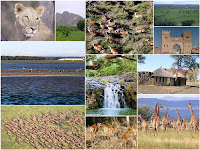South Sudan's Elephants And Other Animals In Great Danger Of Becoming Extinct
Elephants in South Sudan could soon be extinct due to unchecked and uncontrolled, increased poaching and trafficking, conservationists warn. For a country that has just gained independence and which has had about fifty years of civil war and much instability during that time, its wildlife is supposed to be better protected than before. And yet, paradoxically, during those many years of war and instability - its wildlife, although also poached and eaten, were safer than now. All its wildlife: plants, flora and small and large animals were safer. South Sudan's savanna was the largest in Eastern Africa. Today, South Sudan's awesome wildlife is in danger of being destroyed: its wild animals, elephants in particular, are relentlessly being cruelly hunted down by well armed, well organized poachers. Poachers and trafickers from within the country, and many from outside are attracted by abundant, poorly protected wild animals.
Twenty five years ago, there were over 120,000 elephants in South Sudan; today, they number about, only, 5,000 - and maybe much fewer than this. With the current rate of well organized poaching - which involves even South Sudan's security organs, the country could soon have no more elephants in the wild. The country's spectacular, yearly animal migration (mainly of an estimated 800,000 white eared kob antelope), which rivals that of the Maasai Mara-Serengeti, could soon, too, be a thing of the past. Rhinos and zebras are, by most reliable reports, extinct in the country's wild. If nothing, drastic, is not done soon, and immediately, South Sudan's wild giraffes will soon disappear.
Elephants, even in places where they are very well protected like in Kenya - are nowadays facing great danger from poachers. This is due to the price of ivory increasing fourfold and demand increasing in South-East Asia, in China in particular. In a country like South Sudan, which has no proper, well enforced wildlife security and protection, wildlife, like elephants, is in even greater danger. The attraction of making, quick and huge amounts of profit draws poachers and traffickers to this new, still unstable country with very few, if any working institutions. The Southern Sudanese government, those in authority and international conservationists should do all it takes, immediately, to protect and conserve one of its most important and greatest treasures: its wonderful, spectacular but greatly in danger wildlife. At the same time, more, intensive presuure should be put on the main destinations for poached wildlife products (especially on China), in controlling the trade.
+ Sudan: One of the Greatest Wildlife wonders on Earth
+ Boma National Park South Sudan
+ WCS
Twenty five years ago, there were over 120,000 elephants in South Sudan; today, they number about, only, 5,000 - and maybe much fewer than this. With the current rate of well organized poaching - which involves even South Sudan's security organs, the country could soon have no more elephants in the wild. The country's spectacular, yearly animal migration (mainly of an estimated 800,000 white eared kob antelope), which rivals that of the Maasai Mara-Serengeti, could soon, too, be a thing of the past. Rhinos and zebras are, by most reliable reports, extinct in the country's wild. If nothing, drastic, is not done soon, and immediately, South Sudan's wild giraffes will soon disappear.
Elephants, even in places where they are very well protected like in Kenya - are nowadays facing great danger from poachers. This is due to the price of ivory increasing fourfold and demand increasing in South-East Asia, in China in particular. In a country like South Sudan, which has no proper, well enforced wildlife security and protection, wildlife, like elephants, is in even greater danger. The attraction of making, quick and huge amounts of profit draws poachers and traffickers to this new, still unstable country with very few, if any working institutions. The Southern Sudanese government, those in authority and international conservationists should do all it takes, immediately, to protect and conserve one of its most important and greatest treasures: its wonderful, spectacular but greatly in danger wildlife. At the same time, more, intensive presuure should be put on the main destinations for poached wildlife products (especially on China), in controlling the trade.
+ Sudan: One of the Greatest Wildlife wonders on Earth
+ Boma National Park South Sudan
+ WCS



